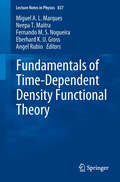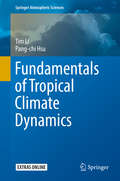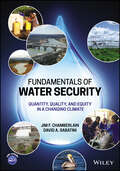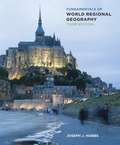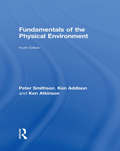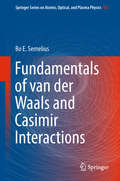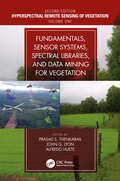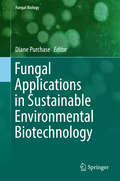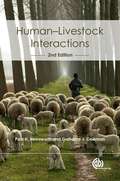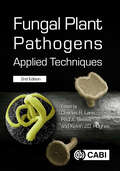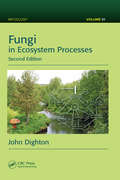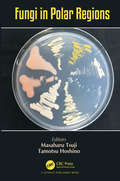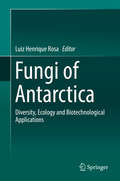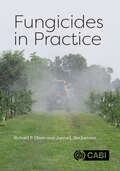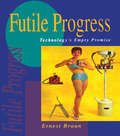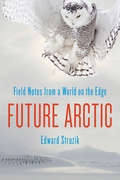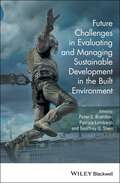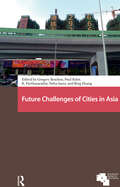- Table View
- List View
Fundamentals of Tensor Calculus for Engineers with a Primer on Smooth Manifolds
by Uwe MühlichThis book presents the fundamentals of modern tensor calculus for students in engineering and applied physics, emphasizing those aspects that are crucial for applying tensor calculus safely in Euclidian space and for grasping the very essence of the smooth manifold concept.After introducing the subject, it provides a brief exposition on point set topology to familiarize readers with the subject, especially with those topics required in later chapters.It then describes the finite dimensional real vector space and its dual, focusing on the usefulness of the latter for encoding duality concepts in physics. Moreover, it introduces tensors as objects that encode linear mappings and discusses affine and Euclidean spaces. Tensor analysis is explored first in Euclidean space, starting from a generalization of the concept of differentiability and proceeding towards concepts such as directional derivative, covariant derivative and integration based on differential forms. The final chapter addresses the role of smooth manifolds in modeling spaces other than Euclidean space, particularly the concepts of smooth atlas and tangent space, which are crucial to understanding the topic. Two of the most important concepts, namely the tangent bundle and the Lie derivative, are subsequently worked out.
Fundamentals of Time-Dependent Density Functional Theory
by Fernando M.S. Nogueira Miguel A.L. Marques Angel Rubio Neepa T. Maitra E.K.U. GrossThere have been many significant advances in time-dependent density functional theory over recent years, both in enlightening the fundamental theoretical basis of the theory, as well as in computational algorithms and applications. This book, as successor to the highly successful volume Time-Dependent Density Functional Theory (Lect. Notes Phys. 706, 2006) brings together for the first time all recent developments in a systematic and coherent way. First, a thorough pedagogical presentation of the fundamental theory is given, clarifying aspects of the original proofs and theorems, as well as presenting fresh developments that extend the theory into new realms--such as alternative proofs of the original Runge-Gross theorem, open quantum systems, and dispersion forces to name but a few. Next, all of the basic concepts are introduced sequentially and building in complexity, eventually reaching the level of open problems of interest. Contemporary applications of the theory are discussed, from real-time coupled-electron-ion dynamics, to excited-state dynamics and molecular transport. Last but not least, the authors introduce and review recent advances in computational implementation, including massively parallel architectures and graphical processing units. Special care has been taken in editing this volume as a multi-author textbook, following a coherent line of thought, and making all the relevant connections between chapters and concepts consistent throughout. As such it will prove to be the text of reference in this field, both for beginners as well as expert researchers and lecturers teaching advanced quantum mechanical methods to model complex physical systems, from molecules to nanostructures, from biocomplexes to surfaces, solids and liquids. From the reviews of LNP 706: "This is a well structured text, with a common set of notations and a single comprehensive and up-to-date list of references, rather than just a compilation of research articles. Because of its clear organization, the book can be used by novices (basic knowledge of ground-state DFT is assumed) and experienced users of TD-DFT, as well as developers in the field." (Anna I. Krylov, Journal of the American Chemical Society, Vol. 129 (21), 2007) "This book is a treasure of knowledge and I highly recommend it. Although it is a compilation of chapters written by many different leading researchers involved in development and application of TDDFT, the contributors have taken great care to make sure the book is pedagogically sound and the chapters complement each other [...]. It is highly accessible to any graduate student of chemistry or physics with a solid grounding in many-particle quantum mechanics, wishing to understand both the fundamental theory as well as the exponentially growing number of applications. [...] In any case, no matter what your background is, it is a must-read and an excellent reference to have on your shelf." Amazon.com, October 15, 2008, David Tempel (Cambridge, MA)
Fundamentals of Tropical Climate Dynamics
by Tim Li Pang-Chi HsuThis textbook introduces fundamental dynamics of tropical atmosphere and ocean useful for advanced graduate courses in atmospheric and climate sciences. It presents an overview of simple atmospheric and oceanic models, as well as the observed phenomena associated with major climate modes in the tropics. It provides students with an up-to-date understanding of the dynamics of tropical climate and weather phenomena. A particular focus is given to scale interactions and atmosphere-ocean interactions associated with tropical mean climate (such as ITCZ asymmetry and annual cycles), synoptic-scale variability (such as synoptic wave trains, easterly waves and tropical cyclones), intraseasonal oscillations (such as Madden-Julian Oscillation and boreal summer intraseasonal oscillation), and interannual variability (such as El Ni#65533;o-Southern Oscillation and Indian Ocean Dipole). Theoretical and conceptual models are presented for better understanding of physical mechanisms behind the observational phenomena. This book aims to motivate graduate students in atmospheric sciences and oceanography by providing them with the key methods and tools necessary to conduct research.
Fundamentals of Underwater Acoustics
by Orlando Camargo RodríguezThis textbook on Underwater Acoustics has a structure that is more organic than logical. It thereby unifies diverse areas of research, including topics of signal processing, the sonar equation, sources and receivers, scattering and reverberation, wave propagation, propagation models, and inverse problems. It also provides code fragments written in Python which complement the discussion. This is a book written for both beginners and specialists, as well as for biologists, oceanographers, computer engineers, physicists, and mathematicians, and for civilian and naval personnel who are looking for a introductory overview of the topic.
Fundamentals of Water Security: Quantity, Quality, and Equity in a Changing Climate
by Jim F. Chamberlain David A. SabatiniFUNDAMENTALS OF WATER SECURITY Understand How to Manage Water Resources to Equitably Meet Both Human and Ecological Needs Burgeoning populations and the ever-higher standards of living for those in emerging countries increase the demand on our water resources. What is not increasing, however, is the supply of water and the total amount of water in earth’s biosphere—water that is integral to all standards of living. Fundamentals of Water Security provides a foundation for understanding and managing the quantity-quality-equity nexus of water security in a changing climate. In a broad sense, this volume explores solutions to water security challenges around the world. It is richly illustrated and pedagogically packed with up-to-date information. The text contains chapter learning objectives, foundation sections reviewing quantitative skills, case studies, and vignettes of people who have made important contributions to water security. To further aid comprehension, end-of-chapter problems are included—both qualitative and quantitative, with solutions available to instructors. Finally, extensive references feature books, journal articles, and government and NGO reports. Sample topics discussed include: How the study of water resources has evolved from a focus on physical availability to include social factors and governance How water security affects multiple disciplines across environmental science and engineering, hydrology, geography, water resources, atmospheric science, chemistry, biology, health science, and social and political science fields How to achieve a sufficient quantity and quality of water to equitably meet both immediate and long-term human and ecological needs Analysis of water security in an integrated manner by underscoring the complex interactions between water quantity, water quality, and society Students taking courses on hydrology, water security, and/or water resource management, along with scientists working in fields where water security is a factor will be able to use Fundamentals of Water Security as a comprehensive textbook to understand and achieve water security.
Fundamentals of World Regional Geography
by Joseph J. HobbsThe book brings course concepts to life with interactive learning, study, and exam preparation tools along with comprehensive text content for one semester/quarter courses. Whether you use a traditional printed text or all digital CourseMate alternative, it's never been easier to better understand the eight world regions, including the historical, cultural, economic, political, and physical aspects that create regional unity, give them personality, and make them newsworthy.
Fundamentals of the Physical Environment: Fourth Edition
by Peter Smithson Ken Addison Ken AtkinsonFundamentals of the Physical Environment has established itself as a well-respected core introductory book for students of physical geography and the environmental sciences. Taking a systems approach, it demonstrates how the various factors operating at Earth’s surface can and do interact, and how landscape can be used to decipher them. The nature of the earth, its atmosphere and its oceans, the main processes of geomorphology and key elements of ecosystems are also all explained. The final section on specific environments usefully sets in context the physical processes and human impacts. This fourth edition has been extensively revised to incorporate current thinking and knowledge and includes: a new section on the history and study of physical geography an updated and strengthened chapter on climate change (9) and a strengthened section on the work of the wind a revised chapter (15) on crysosphere systems - glaciers, ice and permafrost a new chapter (23) on the principles of environmental reconstruction a new joint chapter (24) on polar and alpine environments a key new joint chapter (28) on current environmental change and future environments new material on the Earth System and cycling of carbon and nutrients themed boxes highlighting processes, systems, applications, new developments and human impacts a support website at www.routledge.com/textbooks/9780415395168 with discussion and essay questions, chapter summaries and extended case studies. Clearly written, well-structured and with over 450 informative colour diagrams and 150 colour photographs, this text provides students with the necessary grounding in fundamental processes whilst linking these to their impact on human society and their application to the science of the environment.
Fundamentals of the Theory of Mechanical Vibrations
by Rubens Gonçalves Salsa JuniorThis book presents the fundamental concepts of modeling and analysis of vibrations in mechanical systems with one or more degrees of freedom. The presentation of classic topics is enriched by discussions on equilibrium, stability, and the linearization of the equations of motion. Practical examples throughout the text illustrate the applicability of the theory and explore the physics behind the equations. This book includes various Matlab codes, which allow readers to modify parameters and investigate the behavior of a wide range of mechanical systems. Furthermore, it is demonstrated how some of the mechanical systems studied can be constructed using ordinary materials, enabling readers to compare the theoretical results predicted by the mathematical models with the actual observed behavior.
Fundamentals of van der Waals and Casimir Interactions (Springer Series on Atomic, Optical, and Plasma Physics #102)
by Bo E. SerneliusThis book presents a self-contained derivation of van der Waals and Casimir type dispersion forces, covering the interactions between two atoms but also between microscopic, mesoscopic, and macroscopic objects of various shapes and materials. It also presents detailed and general prescriptions for finding the normal modes and the interactions in layered systems of planar, spherical and cylindrical types, with two-dimensional sheets, such as graphene incorporated in the formalism. A detailed derivation of the van der Waals force and Casimir-Polder force between two polarizable atoms serves as the starting point for the discussion of forces: Dispersion forces, of van der Waals and Casimir type, act on bodies of all size, from atoms up to macroscopic objects. The smaller the object the more these forces dominate and as a result they play a key role in modern nanotechnology through effects such as stiction. They show up in almost all fields of science, including physics, chemistry, biology, medicine, and even cosmology. Written by a condensed matter physicist in the language of condensed matter physics, the book shows readers how to obtain the electromagnetic normal modes, which for metallic systems, is especially useful in the field of plasmonics.
Fundamentals, Sensor Systems, Spectral Libraries, and Data Mining for Vegetation
by Prasad S. Thenkabail, John G. Lyon and Alfredo HueteWritten by leading global experts, including pioneers in the field, the four-volume set on Hyperspectral Remote Sensing of Vegetation, Second Edition, reviews existing state-of-the-art knowledge, highlights advances made in different areas, and provides guidance for the appropriate use of hyperspectral data in the study and management of agricultural crops and natural vegetation. Volume I, Fundamentals, Sensor Systems, Spectral Libraries, and Data Mining for Vegetation introduces the fundamentals of hyperspectral or imaging spectroscopy data, including hyperspectral data processes, sensor systems, spectral libraries, and data mining and analysis, covering both the strengths and limitations of these topics. This book also presents and discusses hyperspectral narrowband data acquired in numerous unique spectral bands in the entire length of the spectrum from various ground-based, airborne, and spaceborne platforms. The concluding chapter provides readers with useful guidance on the highlights and essence of Volume I through the editors’ perspective. Key Features of Volume I: Provides the fundamentals of hyperspectral remote sensing used in agricultural crops and vegetation studies. Discusses the latest advances in hyperspectral remote sensing of ecosystems and croplands. Develops online hyperspectral libraries, proximal sensing and phenotyping for understanding, modeling, mapping, and monitoring crop and vegetation traits. Implements reflectance spectroscopy of soils and vegetation. Enumerates hyperspectral data mining and data processing methods, approaches, and machine learning algorithms. Explores methods and approaches for data mining and overcoming data redundancy; Highlights the advanced methods for hyperspectral data processing steps by developing or implementing appropriate algorithms and coding the same for processing on a cloud computing platform like the Google Earth Engine. Integrates hyperspectral with other data, such as the LiDAR data, in the study of vegetation. Includes best global expertise on hyperspectral remote sensing of agriculture, crop water use, plant species detection, crop productivity and water productivity mapping, and modeling.
Fungal Applications in Sustainable Environmental Biotechnology
by Diane PurchaseFungi are distinct eukaryotic organisms renowned for their remarkable biodiversity and extensive range of habitats. Many fungal species have long been exploited for food and medicines. This volume considers other important applications of fungal biotechnology especially in an environmental context, showcasing the essential contributions of these amazingly versatile organisms. It explores how fungi offer sustainable solutions to tackle various environmental concerns. Written by eminent experts in their fields, this work presents a broad array of current advances and future prospects in fungal environmental biotechnology and discusses their limitations and potential. The book is organized in five parts, each addressing a theme of the UN Sustainable Development Goals (SDG): strengthen food security (Zero Hunger), wastewater treatment (Clean Water & Sanitation), pollution reduction (Life on Land), biofuel production (Affordable & Clean Energy) and biosynthesis of novel biomolecules (Responsible Consumption & Production).
Fungal Plant Pathogens
by Charles Lane David Cooke Kelvin Hughes Jenny Tomlinson David Galsworthy Christopher Thornton Belinda Phillipson Paul Beales Matthew RyanCovering the key techniques used when working with fungal plant pathogens, this practical manual deals with recognition of disease symptoms, detection and identification of fungi and methods to characterise them well as curation, quarantine and quality assurance. The book is unique in its practical focus, providing an overview of both traditional and emerging methods and their applications, and detailed protocols on completion techniques such as microscopy, PCR, ELISA, freeze drying and DNA storage. Fungal Plant Pathogens provides a valuable guide to investigating fungal plant diseases and interpreting laboratory findings for postgraduate and advanced undergraduate students, extension plant pathologists, consultants and advisers in agriculture and horticulture and the food supply chain.
Fungal Plant Pathogens: Applied Techniques
by Paul Kirk David Smith David Cooke Jenny Tomlinson David Galsworthy Christopher Thornton Belinda Phillipson Michael Long Rachel Barker Matthew J Ryan Kinda Alraiss Victoria Barton Lucy Carson-Taylor Ashleigh Elliot Steve Hendry Anthony Kermode Aiga Ozolina Ana Pérez-Sierra Joan WebberThis substantially updated edition now in full colour provides key techniques used when working with fungal and fungal-like plant pathogens. As a practical manual it also deals with disease recognition, detection and identification of fungi, plus methods to characterise and curate fungi and handle them under quarantine and quality assurance systems. Furthermore, this new edition includes significant updates with respect to: - Greater awareness and concern internationally about plant health and biosecurity. - Molecular biology - next generation sequencing and in-field detection. - Improved opportunities for surveillance and detection in diverse substrates. - Changes in taxonomy and reference to current fungal plant pathogens. - New chapters on tree health, and public awareness, outreach and communications. Fungal Plant Pathogens: Applied Techniques, 2nd edition provides a valuable guide to investigating fungal plant diseases and interpreting laboratory findings for postgraduate and advanced undergraduate students, extension plant pathologists, consultants and advisers in agriculture, forestry and horticulture, and the food supply chain.
Fungi as Bioremediators
by Ajit Varma Ebrahim Mohammadi Goltapeh Younes Rezaee DaneshBiological remediation methods have been successfully used to treat polluted soils. While bacteria have produced good results in bioremediation for quite some time now, the use of fungi to decontaminate soils has only recently been established. This volume of Soil Biology discusses the potentials of filamentous fungi in bioremediation. Fungi suitable for degradation, as well as genetically modified organisms, their biochemistry, enzymology, and practical applications are described. Chapters include topics such as pesticide removal, fungal wood decay processes, remediation of soils contaminated with heavy and radioactive metals, of paper and cardboard industrial wastes, and of petroleum pollutants.
Fungi in Ecosystem Processes (Mycology #Vol. 17)
by John DightonThis new edition of Fungi in Ecosystem Processes continues the unique approach of examining the roles of fungi from the perspective of ecosystem functions. It explores how fungi have adapted to survive within particular constraints, how they help to maintain homeostasis in ecosystems, how they facilitate resistance to perturbations, and how they influence the communities of other organisms. Updated and revised, the second edition Expands the section on plant pathogens, invasive species, and insect–fungal interactions Provides more extensive coverage on insect–fungal interactions, including entomopathogens, the links between entomopathogens and endophytes, and symbiotic and mutualistic interactions Adds a new section on fungi in the built environment Presents new material on below-ground to above-ground interactions mediated through fungi, such as mycorrhizal signaling systems for herbivory defense The book also includes expanded coverage of the role of fungi in suppressive soils, aquatic and marine fungi, modern methods of following food chains in fungal–invertebrate trophic interactions, and the physiology of nutrient uptake by mycorrhizae. A necessary update and expansion to previous material, this book provides an essential reference on the current understanding of fungal roles in ecosystem processes. It also identifies directions for future study, including an emphasis on the need for further research on fungi in built environments.
Fungi in Polar Regions
by Masaharu Tsuji Tamotsu HoshinoFungi that inhabit polar-region can grow and decompose organic compounds under subzero temperatures play important roles in the nutrient cycle of polar-region ecosystems. Thus, changes in the mycoflora affect the ecological recycling in these regions, and understanding the cold-adaptation strategies of fungi under extreme environments is critical for a better understanding of polar-region ecosystems. Due to their ability to survive under extreme environments, fungi in polar-region are seen to show potential for utilization in biotechnologies. This book presents our current understanding of the mycoflora in polar-region and their cold adaptation strategies, and applied studies using their abilities.
Fungi of Antarctica: Diversity, Ecology and Biotechnological Applications
by Luiz Henrique RosaThis book focuses on the fungi found in one of the most pristine regions on Earth: Antarctica. It discusses the fungal occurrence in all substrates of the region, including soil, seawater, lake and marine sediments, rocks, ice, and snow. It also addresses the impact of climate changes on these organisms, the genomic techniques developed to study them, and how a number of compounds, such as antibiotics and enzymes, produced by the Antarctic fungi can be used in medicine, agriculture and the chemical industry.
Fungicides in Crop Protection
by Richard Oliver H HewittPlant pathogenic fungi cause devastating damage to crop production worldwide. The growing global population necessitates reduced crop losses to improve food security, and the control of fungal plant pathogens is vital to help maintain food production. Providing a concise and balanced review of fungicides used in crop protection, this book describes the science of fungicide use, selection and resistance within the context of farming situations. Major updates and additions reflecting the emergence of two new classes of fungicides (strobilurins and SDHI) and the increased incidence of fungicide resistance are included in this new edition, which also discusses legislative requirements to reduce fungicide applications, and current trends in fungicide use.
Fungicides in Practice
by Richard P. Oliver Professor Janna L BeckermanThis is an up-to-date guide on the science and practice of disease control based on fungicides in horticulture and broad acre agriculture. It describes how conventional, organic and biological fungicides are discovered, how they work and how resistance evolves. Chapters on formulation, mode of action, mobility and application inform decisions about which fungicides to use, when to use them, and how to rotate (or tank-mix) them, to manage both plant disease and fungicide resistance. A chapter on experimental design of fungicide trials aids practitioners in designing their own trials to evaluate how effective products are for their plant disease problem. Based on the successful 2014 book of Fungicides in Crop Protection this edition has four entirely new chapters, and extensive updates to the other nine chapters. The contents include: · Fungicide markets, discovery and performance. · Modes of action and spectrum. · Biological crop protection, and organic cultivation. · Fungicide formulation, mobility and application. · Experimental design of fungicide trials and their analysis. · Fungicide resistance. · Legislation and regulation. Written for crop protection professionals and scientists, growers, agronomists and consultants, the book is also suitable for students of agriculture and agronomy.
Funicular Structures: The Art of Building Efficiently
by Damon BolhassaniFunicular structures are structural skeletons designed using methodologies that analyze the flow and direction of forces, which can be categorized as compression, tension, or a combination of both. They are not only elegant, resembling naturally occurring forms, but also highly efficient and can be built with minimal use of relatively low-strength materials, thus minimizing their negative environmental impact. This book presents an in-depth overview of the theoretical foundations and practical methods of designing funicular structures for maximum efficiency.Beginning with a foundation and introduction to funicular structures for those new to the subject, the book then provides in-depth coverage of cables, arches, shells and vaults, domes, and spatial structures. Chapters explain the theory behind funicular structures in 2D, spatial funicular structures in 3D and examine their structural behavior. Recent and historically famous structures from around the globe are analyzed, and their potential design methods revealed through step-by-step, visual explanations. Structural analysis of funicular structures in different forms are also presented to demonstrate pitfalls and common errors.Tracing the various methods of designing funicular structures, including the latest computational tools, this book provides a solid foundation for students of architecture, structural design, civil engineering, landscape design, and environmental design, to embark on their own funicular design projects.
Futile Progress: Technology's empty promise (Earthscan Library Collection: International Environmental Governance Set Ser.)
by Ernest BraunDo new innovations and products improve our lives? Has our relentless pursuit of technological progress eliminated the blight of poverty, of inequality, of discrimination, of crime, of war? Has the advance of technology increased our happiness and led us to fulfillment and social harmony? The ads would have us think so. But not all technological innovation is desirable, and the fastest rate of change is not necessarily the best. Futile Progress explores the multiple and far-reaching ways in which our society and our environment have been affected by technological change. It reveals how far unfettered 'advances' can be blamed for environmental damage, and analyses to what extent our unquestioning acceptance of new technologies has contributed to the social insecurity, inequality and dislocation evident today. In this original and thought provoking book, Ernest Braun argues for effective safeguards against these adverse effects of technologies beneficial to society receive public support. Only if the consequences of technological change are anticipated can technology be harnessed to work for common good.
Future Arctic: Field Notes from a World on the Edge
by Edward StruzikIn one hundred years, or even fifty, the Arctic will look dramatically differthan it does today. As polar ice retreats and animals and plants migrate northward, the arctic landscape is morphing into something new and very differfrom what it once was. While these changes may seem remote, they will have a profound impact on a hof global issues, from international politics to animal migrations. In Future Arctic, journalist and explorer Edward Struzik offers a clear-eyed look at the rapidly shifting dynamics in the Arctic region, a harbinger of changes that will reverberate throughout our entire world.Future Arctic reveals the inside story of how politics and climate change are altering the polar world in a way that will have profound effects on economics, culture, and the environmas we know it. Struzik takes readers up mountains and cliffs, and along for the ride on snowmobiles and helicopters, sailboats and icebreakers. His travel companions, from wildlife scientists to military strategists to indigenous peoples, share diverse insights into the science, culture and geopolitical tensions of this captivating place. With their help, Struzik begins piecing together an environmental puzzle: How might the land's miconic species—caribou, polar bears, narwhal—survive? Where will migrating birds flock to? How will ocean currents shift? And what fundamental changes will oil and gas exploration have on economies and ecosystems? How will vast unclaimed regions of the Arctic be divided?A unique combination of extensive on-the-ground research, compelling storytelling, and policy analysis, Future Arctic offers a new look at the changes occurring in this remote, mysterious region and their far-reaching effects.
Future Challenges for the U.S. Geological Survey's Mineral Resources Program
by Committee to Review the U.S. Geological Survey's Mineral Resources ProgramThe committee assesses the USGS's responses to a 1996 program review, evaluates the minerals information team, and examines how the program's mission and vision might evolve to meet the nation's future needs over the next decade.
Future Challenges in Evaluating and Managing Sustainable Development in the Built Environment
by Patrizia Lombardi Geoffrey Q. Shen Peter S. BrandonFuture Challenges in Sustainable Development within the Built Environment stimulates and reinterprets the demands of Responsible and Sustainable Development in the Built Environment for future action and development. It examines the methods of evaluation, the use of technology, the creation of new models and the role of human factors for examining and developing the subject over the next twenty years.
Future Challenges of Cities in Asia (Asian Cities)
by R. Parthasarathy Gregory Bracken Paul Rabé Neha Sami Bing ZhangThe ten essays in Future Challenges of Cities in Asia engage with some of the most critical urban questions of the near future across Asia. These comprise socio-economic and cultural transitions as a result of urbanization; environmental challenges, especially questions of climate change, natural disasters, and environmental justice; and the challenges of urban infrastructure, built form, and new emerging types of urban settlements. The essays demonstrate that it is increasingly difficult to conceptualize the 'urban' as one particular type of settlement. Rather, it would be more accurate to say that the 'urban' characterizes a global transition in the way we are beginning to think about settlements. This book is of interest not only to researchers interested in comparative and inter-disciplinary research, but also to urban practitioners more broadly, illustrating through concrete cases the challenges that urban regions in Asia and beyond are facing, and the various opportunities that exist for dealing with these challenges.

